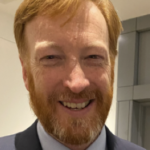Podcast: Play in new window | Download
On this episode of the Healthy, Wealthy and Smart Podcast, Jenna Kantor guests hosts and interviews Clay Watson, Tyler Vander Zanden and Kelly Reed on the Private Practice Section’s Key Contacts. PPS is more effective with the support of members who are dedicated to advocating on behalf of the industry. You can get involved in the section’s advocacy efforts by becoming a Key Contact, joining the key contact subcommittee, or by taking action online via the APTA Legislative Action Portal.
In this episode, we discuss:
-What are the responsibilities of the PPS’s Key Contacts?
-How a Key Contact bridges the gap between legislators and constituents
-The personal and professional benefits of being a Key Contact
-And so much more!
Resources:
Private Practice Section Key Contacts
A big thank you to Net Health for sponsoring this episode!
Check out Optima’s Top Trends For Outpatient Therapy In 2020!
For more information on Clay:
 Clay Watson a Physical Therapist and owner/operator of Western Summit Rehabilitation, a consulting and therapy services staffing agency for home health. He is a Past President of the Homecare and Hospice Association of Utah, a member of the Utah Falls Prevention Alliance and a recipient for an NIH falls prevention grant. This year I received the Excellence in Home Health Therapy Leadership Award from the Home Health Section of the APTA.
Clay Watson a Physical Therapist and owner/operator of Western Summit Rehabilitation, a consulting and therapy services staffing agency for home health. He is a Past President of the Homecare and Hospice Association of Utah, a member of the Utah Falls Prevention Alliance and a recipient for an NIH falls prevention grant. This year I received the Excellence in Home Health Therapy Leadership Award from the Home Health Section of the APTA.
For more information on Kelly:
 Kelly received her COMT (Certified Orthopedic Manual Therapist) from the North American Institute of Orthopedic Manual Therapy in 1994 and is an Orthopedic Certified Specialist (OCS). She received her Physical Therapy degree from Pacific University in 1983.
Kelly received her COMT (Certified Orthopedic Manual Therapist) from the North American Institute of Orthopedic Manual Therapy in 1994 and is an Orthopedic Certified Specialist (OCS). She received her Physical Therapy degree from Pacific University in 1983.
Kelly prides herself as being an excellent general orthopedic physical therapist. She specializes in lower-extremity dysfunctions, biomechanical assessments related to running/sports injuries, and assessments from minimalist training to custom-molded orthotics. She focuses on injury prevention through balancing the full body, not just the area of pain. Additionally, she has specialized in the area of Temporomandibular dysfunction (TMD) for over 30 years.
Most recently she has been active in starting a BreathWorks program focusing on evaluation and education related to breathing physiology and its effect on overall wellness and healing. Her clinical skills continue to move in a direction that empowers clients to achieve their highest level of function in a balanced fashion.
Kelly was a 3-sport collegiate athlete and continues her love of athletics through her own personal training, running, yoga and being a supportive presence at her kids’ sporting events. An outdoor enthusiast, she loves trail running, hiking, gardening, camping, and keeping up with her husband Greg and their 3 active kids.
For more information on Tyler:
 Dr. Tyler Vander Zanden is the former Founder and CEO of Movement Health Partners, a private practice company partnering with federal, corporate, and educational agencies to provide physical therapy services. Tyler currently serves as a member of the Key Contact Subcommittee for the Private Practice Physical Therapy Section (PPS), where he meets with legislators to increase awareness of the key issues facing physical therapist-owned businesses and their patients.
Dr. Tyler Vander Zanden is the former Founder and CEO of Movement Health Partners, a private practice company partnering with federal, corporate, and educational agencies to provide physical therapy services. Tyler currently serves as a member of the Key Contact Subcommittee for the Private Practice Physical Therapy Section (PPS), where he meets with legislators to increase awareness of the key issues facing physical therapist-owned businesses and their patients.
Tyler earned his Doctorate of Physical Therapy from Marquette University along with a BS in Exercise Science. Upon graduation, he completed a post-doctoral residency in Orthopedics from the University of Wisconsin-Madison. Tyler is a board-certified by the American Board of Physical Therapy Specialties (ABPTS), as a clinical specialist in Geriatric Physical Therapy.
Tyler has an avid passion for high performance, technology and entrepreneurship and speaks regularly about finance and technology as it relates to the future of physical therapy. He currently resides in Austin, TX where he serves his church and community and is launching his next start-up venture.
For more information on Jenna:
 Jenna Kantor (co-founder) is a bubbly and energetic girl who was born and raised in Petaluma, California. Growing up, she trained and performed ballet throughout the United States. After earning a BA in Dance and Drama at the University of California, Irvine, she worked professionally in musical theatre for 15+ years with tours, regional theatres, & overseas (www.jennakantor.com) until she found herself ready to move onto a new chapter in her life – a career in Physical Therapy. Jenna is currently in her 3rd year at Columbia University’s Physical Therapy Program. She is also a co-founder of the podcast, “Physiotherapy Performance Perspectives,” has an evidence-based monthly youtube series titled “Injury Prevention for Dancers,” is a NY SSIG Co-Founder, NYPTA Student Conclave 2017 Development Team, works with the NYPTA Greater New York Legislative Task Force and is the NYPTA Public Policy Committee Student Liaison. Jenna aspires to be a physical therapist for amateur and professional performers to help ensure long, healthy careers. To learn more, please check out her website: www.jennafkantor.wixsite.com/jkpt
Jenna Kantor (co-founder) is a bubbly and energetic girl who was born and raised in Petaluma, California. Growing up, she trained and performed ballet throughout the United States. After earning a BA in Dance and Drama at the University of California, Irvine, she worked professionally in musical theatre for 15+ years with tours, regional theatres, & overseas (www.jennakantor.com) until she found herself ready to move onto a new chapter in her life – a career in Physical Therapy. Jenna is currently in her 3rd year at Columbia University’s Physical Therapy Program. She is also a co-founder of the podcast, “Physiotherapy Performance Perspectives,” has an evidence-based monthly youtube series titled “Injury Prevention for Dancers,” is a NY SSIG Co-Founder, NYPTA Student Conclave 2017 Development Team, works with the NYPTA Greater New York Legislative Task Force and is the NYPTA Public Policy Committee Student Liaison. Jenna aspires to be a physical therapist for amateur and professional performers to help ensure long, healthy careers. To learn more, please check out her website: www.jennafkantor.wixsite.com/jkpt
Read the full transcript below:
Jenna Kantor (00:00):
Hello, this is Jenna Kanter with healthy, wealthy, and smart. I am here with three newer friends this year. We all our key contacts with the private practice section and we’re coming on. Well, they’re going to do more of the talking here. I’m just going to be doing the questions and if we’re coming on to just say, Hey, this is a great opportunity to get involved. If you do not like the CMS cuts, this is what we do. We go and speak with the legislators to talk about that. We’re getting more people to come and join us in this huge movement to fight for our profession, especially the private practices for all you people are working for private practices. This is the committee to be a part of, so please, please join the APTA, come join us and be a part of this great movement. I am here with Kelly Reed, Tyler Vander Zanden and Clay Watson. Yes, you guys. First of all, thank you so much for coming on. So I’m going to hand it to you first. Kelly, how did you first learn of being a key contact?
Kelly Reed (01:06):
Yeah, so I’ve been a member of PPS since I got out of PT school and I’ve always been involved. I’ve been on the board of PPS and wanting to get back into it. And so I just put my name out there, who needs help, how can I be helpful, wanted to kind of get on the government affairs committee. And instead I got asked to be on the key contact task force and it’s been amazing.
Clay Watson (01:33):
I’m friends with some other physical therapists who’ve participated in this project and we had some interesting legislative successes in our state that helped reform some payment policy issues. And it kind of led to them asking me to help out with the congressional level.
Tyler Vander Zanden (01:53):
I actually got invited last year at the 2019 Graham sessions in Austin and I live in Austin. And that really kind of propelled me to do something, a call to action and how can I get involved personally. And so I looked at PPS to see where I could be of service and one of the openings was this key contact position.
Jenna Kantor (02:15):
I love it. And just to make sure for any students who might be listening, PPS stands for private practice section. So it is a section of the APTA. Clay, I’m going to move to you just because my eyes just happened to look up at you. So what does a key contact do?
Clay Watson (02:33):
We have been asked to develop relationships with specific legislators and every member of the private practice section and the APTA lives in a congressional district or they have a Senator and it makes sense to pair up people who have vested stake in policy to have a relationship with a representative or a Senator from their state. And this program designed to help us have longterm relationships so that when policy needs are coming up, we’ll have a listening ear and there’ll be able to hopefully hear the sides of our argument that are most beneficial to our profession.
Jenna Kantor:
Kelly, what is the time commitment with this?
Kelly Reed (03:14):
Yeah, minimal. We are asked, well a couple things, we have a monthly meeting and we are given contacts of which you just email the people and try and hook them up with their legislator and that might take, depending on how long your list is, you know anywhere between 15 to 45 minutes. Then we have an hour meeting and then the bigger thing is that we are provided all the information we need and when an action item comes out they send it to us and then all we have to do is basically cut and paste a letter and send it off to our legislature.
Jenna Kantor:
Yes. Would you Tyler mind differentiating between being a key contact with private practice section and also being a key contact on the committee?
Tyler Vander Zanden (04:09):
Yes. So being a key contact in general, what we’re asking of those individuals that they be a private practice member and that they live in the district to what we’re trying to assign them to. So we want them to have a relationship with that Congressman or Congresswoman in their specific district. So like as Kelly said and clay said, when there’s an issue at hand in the profession or just to private practice in general, that congressional leader has a name and face of a person or a clinic that they can say, Oh, wow, you know, Kelly or Jenna or clay, like, you know, you’re dealing with this right now and you’re one of my constituents. And so we can have that relationship. And so that’s what it looks like more at the key contact level. For us, like Kelly said we’re on the committee side.
Tyler Vander Zanden (04:55):
We’re the ones who are providing education to that specific key contact in the form of emails. We’ll kind of give them block templates. So when they have to make that communication, it’s not so hard. We send them and the practice or a chapter here sends us emails that they can be kind of up to speed on these legislation things. And then we recently had shot some videos in DC explaining the roles of the key contact. And so there’ll be some videos that we’ll have on the PPS website that they’ll be able to always link back to if they need more education.
Kelly Reed (05:33):
Yeah. And I just wanted to build on those videos. They’re short snippets, they won’t take a lot of your time, but it gives you a lot of key information, just the nuts and bolts of what you need and you can look at them at your leisure and really helpful information.
Jenna Kantor:
Yeah. Clay, does it work? Does making a phone call if instructed to do that to sending an email or meeting with the legislator? Does that or is that a waste of people’s time?
Clay Watson (05:59):
Well, it wouldn’t be a waste of time or we wouldn’t do it. Right. I mean one of the most interesting things when we had a legislative fly in this fall, I was with another therapist who had actually written the letter to get the wife of one of our congressmen into physical therapy school and it was her first employer. Now she’s a home health physical therapist and that’s what I do. I’m private practice owner, but I work in home health and when we are asking him questions specific to our industry, he understands private practice and he understands home health better than almost any Congressman out there. And so that’s just a huge listening ear that we wouldn’t have if we didn’t have those longterm relationships.
Jenna Kantor (06:41):
I really just want to add in person is more effective than on the phone. On the phone is more effective than email. It is like any other relationship. So really the best way to make no change is to not do anything. What we’re doing is the best way to make a change. It’s where we have this insane power as constituents. Now for you, Kelly, what has been the biggest thing that has moved you and how the private practice section runs and works with the key contacts? Like what do you think is just so incredible that they do to make us so efficient with what we do to put our message out there to the right people?
Kelly Reed (07:27):
Yeah, I’ve been really impressed with the amount of information that PPS already has put together and the task force and members before us that are currently on the task force. Basically they hand you everything you need to be able to do your job to make and develop a relationship with your Congressman. It’s really easy and I want to say for those who may be put off a little bit about not getting politically involved, we have to, this is our profession and when we know what we know, we know what we love and all we have to do is communicate that message. We build relationships every single day and that’s exactly what this is just talking about what we love.
Jenna Kantor (08:11):
I think that’s excellent. And any last words that any of you would like to say in regards to becoming a key contact for anyone who might be hesitant on jumping in?
Clay Watson (08:23):
One of the most important things I’ve learned is the value of the mentorship I’ve received from participating in this. Every time I have a question about how to approach an issue with one of our legislators, I have three or four other therapists who are also doing it that I can ask. They may know context about the legislature themselves and how to approach them on specific issues and they know the nuance of the issues in a way that helps me understand them with a lot more depth. So it’s sort of like a pretty high value team to help the whole situation move forward and that’s invaluable.
Jenna Kantor (08:56):
I love that. Thank you so much. And if you’re wondering, I don’t know what this is for me, why am I listening to this? They’re just selling me, telling me to get involved. This is where the change you want to happen. I get the most interactions on my personal Facebook page when I write the word happiness because people are happy in the physical therapy world. This is what we are doing to make that huge change. I am saying this statement very strongly. I know everybody can have their own opinion. This is mine, but this is the majority of the profession in which I interact with which are non-members. This is the big culture of unhappiness and this is where we make that change. The private practice section are movers and shakers and are listening and taking such great action. These people who are here, who I’m interviewing are passionate, kind humans. We are all volunteering our time. We are all not getting paid and we’re all doing it for you and we would love for you to join us because your voice is valuable.
Clay Watson (09:58):
Well, I think most of the time the people who are unsatisfied with the profession are the least engaged and sometimes they are very engaged in are not happy. But generally speaking, the more you’re involved with the APTA, the more voice you have and the more ability you have to affect change. As physical therapists, our whole life is based on helping people affect change. And if you feel disempowered or however you want to describe it, the way to get that power back is to follow your own practice and dig in and take responsibility for it as much as you can. And there are many times when you’re going to do it for not, that’s just how life works. But the truth is trying to get better is amazingly empowering. And once in a while you get lucky and you actually do make a big change.
Tyler Vander Zanden (10:46):
Yeah. And I just wanted to say one more thing to dovetail is you’re not alone. So if you’re right now, if you’re stuck and you’re trying to figure out what to do, you have to start somewhere. And one of the beautiful things about getting on this subcommittee now less than a year is the networking and everything that the PPS and all the people that I’ve been able to meet not only in private practice, but then as a result of this legislative work that we’ve done. So something really to consider and if your slot is taken if you want to get on here and we don’t have a specific slot open in your district, you can always start these efforts on your own and we would always be able to help you with that education that’s still on the website there for your use.
Jenna Kantor (11:28):
I love it. Thank you. Thank you to each of you for coming on, this has meant so much to me. I know it means a lot to you as well. If any of you want to learn more, you can go to the private practice section website. It’s under the advocacy tab where you’ll find committees and you’ll find key contacts. That’s how you can get involved. Thank you for tuning in. Take care.
Thanks for listening and subscribing to the podcast! Make sure to connect with me on twitter, instagram and facebook to stay updated on all of the latest! Show your support for the show by leaving a rating and review on iTunes!

